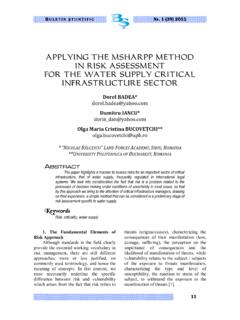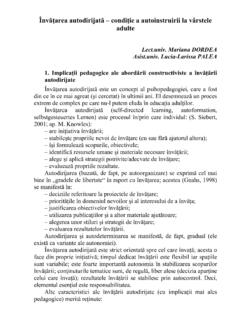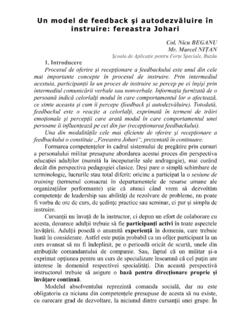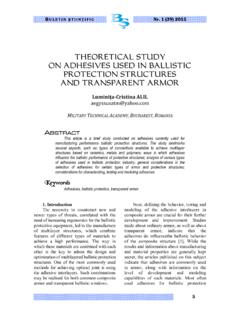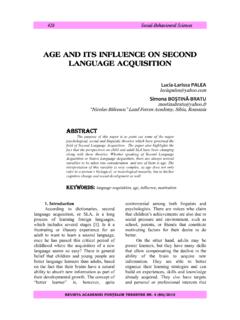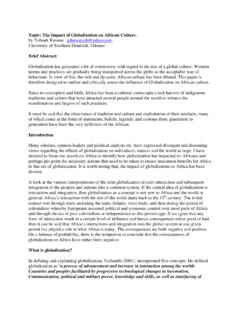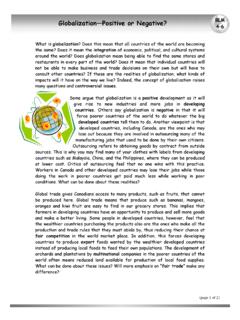Transcription of ORGANIZATIONAL CULTURE IN THE AGE OF …
1 1 20 N r. 2 ( 38) 201 4 BULETIN TIIN IFIC ORGANIZATIONAL CULTURE IN THE AGE OF globalization Emanoil MUSCALU LUCIAN BLAGA UNIVERSITY OF SIBIU, ROMANIA ABSTRACT There is no definition of globalization in a form universally accepted and perhaps not even final one. The reason is that globalization includes a multitude of complex processes, reaching different areas of society. It can be a phenomenon, an ideology, a strategy or all together. One thing is certain: globalization raises an endless polemic, progressing continuously and irreversibly generate major effects, with both supporters and objectors. As a strict deadline, globalization means the multitude of economic and social transformation of humanity currently registered, and integrative large-scale financial flows generated by the impact of monetary haul on the characteristics of social interactions.
2 According to experts' opinions, globally we can identify several types of crops: global (overall) national economic branches of economic activity and ORGANIZATIONAL . Global CULTURE , the national and ORGANIZATIONAL interconnected as it provides outstanding support and are indicators in the birth, evolution, performance and visibility of an organization. All processes taking place in an organization is subject to ORGANIZATIONAL Keywords globalization , organization, ORGANIZATIONAL CULTURE 1. Introduction The theme of glob alization is quite widely debated, drawing both supp orters and opp onents, each t ry ing t o supp ort t heir own arguments as convincing.
3 But regardless of what is claimed by supp orters and opponents, globalization is already an ongoin g p rocess, and organizations can not ignor e it . Whether globalization is an adv antage or a drawback for an organization, dep ending on the p olitical and economic situation of t he societ y in which it op erat es, t he p rocess itself can not be ignored [1]. 2. globalization S cientific Concepts Evolving Continuously The word globalization is of Anglo-Saxon or igin ( globalization ), sy nony mous wit h French mondialisation and sits on every one's lip s: for some globalization is somet hing t hat we must achieve if we are t o be happy ; accordin g t o ot hers, t he source of our unhapp iness.
4 What is certain, is that glob aliz at ion is destiny heading in exorably toward the world, an irreversible process that affects us all equally and in th e same way [2]. 1 21 N r. 2 ( 38) 201 4 BULETIN TIIN IFIC Issues regardin g globalization app ear from the moment of defining test this notion. globalization , very broadly , refers to the p rocess by which social rel at ions are relatively devoid of factors distance and borders, so that human life takes p lace increasin gly more off a world seen as a unique p lace. The term globalization was first used in a Webster dictionary in 1961.
5 Sin ce the mid-80s began to be used as an adjective other t erms as market s, inst it ut ions, ecology , finance, lifesty le, communication, migration, laws fact ories, war, conferences, civil society events and risks [3]. Scientists and p ublic op inion have not fallen y et agr eed on a sin gle def inition. They set different definitions of globalization , but none was fully satisfactory , very hard to define the term confusin g (y et) and ext remely comp le x. Ev ery aut hor who has defined globalization has highlighted a p articular asp ect or dimension of it. The most general definition of glob alization is giv en by Andrew Jones in his globalization .
6 Fundamental th eorists: interconnection and increasing interrela tedness of all aspects of soci ety [4]. Geor ge Soros in h is work On globalization , gave a defin ition p rimarily economic globalization is the free movement of capital accompanied by the growing dominance of globa l finan cial markets and multinational corporations on national economies [5]. Br it ish sociolo gist Anthony Giddens defines globalization using main ly sociolo gic al ele ment s: globalization can be defined as the intensification of worldwide social relations which link to such an extent remote plac es that ev ents that occur local ly are v iewed through the prism of similar others, spent many miles away and vice versa [6].
7 One comp lete def initions of glob alization was giv en by Tiberiu Br ilean in globalization . No name anything. It considers globalization as a phenomenon and a complex process characterized mainly b y: a profound tendency retrieval unit; increasing global interdep endence; internationa lization of trade and production; liberalization of markets; free mov ement of capital, information, people and goods; the third industrial revolution and transnationalization techno logy; dominance of multinational companies; increased compe tit ion (th e e xtremel y high) globally; compression of time and space; affirming the CULTURE o f the contract; birth of a global civil society.
8 Impairment of national sovereignty, cultural and spiritua l iden tity [7]. globalization has three main causes: technological, p olitical, economic. They have t riggered a p rocess in which geo gr ap hic dist ance became a fact or in est ablishing and supp orting links nonessential border economic relat ions, int ernat ional p olit ica l and socio-cult ural t hat we c all glob aliz at ion. This int ernat ionaliz at ion p ot ent ial relat ionship s and dep endencies causes p lan deficits democrat ic, environment al, soci al and safet y and effe ct s such as chan gin g at t it udes and administ rat ive defi cien cies [8].
9 Some sp ecialist s consider glob aliz at ion as a hu man f actor integration into the global community , p roviding a venu e new sy stems of global governan ce and global civil societ y . Ot hers relat e t o t he p rocess of glob aliz at ion wit h host ilit y , even fear, believ in g that it causes uneven growth amon g nations, causin g unemp loy ment and t hreat en living st andards and socia l p rocess. Globalisation extensive op p ortunities arise for real develop ment globally , but they are manifested through unequal p rogress regions. Some countries integrate into the world economy at a rate much higher than others.
10 Countries that have managed to become p art of a unified global growth p resents more signif icant and subst ant ial decreases in une mp loy ment and p overty . At the same time, econo mic cr ises have shown t hat t he associat ed opp ort unit ies and risks of glob alization invo lve social, economic and environmental d egradation, which is caused by increased p overty . 1 22 N r. 2 ( 38) 201 4 BULETIN TIIN IFIC The term globalization implies that the emer gen ce and t ransformat ion of cert ain p henomena over t he world have acc eler at ed at such a p ace, t hat gives rise t o new p henomena.
